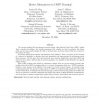Free Online Productivity Tools
i2Speak
i2Symbol
i2OCR
iTex2Img
iWeb2Print
iWeb2Shot
i2Type
iPdf2Split
iPdf2Merge
i2Bopomofo
i2Arabic
i2Style
i2Image
i2PDF
iLatex2Rtf
Sci2ools
ALGORITHMICA
2005
2005
Better Alternatives to OSPF Routing
The current standard for intra-domain network routing, Open Shortest Path First (OSPF), suffers from a number of problems--the tunable parameters (the weights) are hard to optimize, the chosen paths are not robust under changes in traffic or network state, and some network links are overused at the expense of others. We present prototypical scenarios that illustrate these problems. Then, we propose several variants of a protocol to eliminate or alleviate them and demonstrate the improvements in performance under those scenarios. We also prove that these protocols never perform significantly worse than OSPF and show that for at least a limited class of network topologies, it is possible to find efficiently the optimal weight settings. Some of the problems with OSPF are well-known; indeed, there are several routing protocols that perform better than OSPF in routing quality (i.e., in terms of congestion, delay, etc.). OSPF's popularity persists in part because of its efficiency with...
| Added | 15 Dec 2010 |
| Updated | 15 Dec 2010 |
| Type | Journal |
| Year | 2005 |
| Where | ALGORITHMICA |
| Authors | Jessica H. Fong, Anna C. Gilbert, Sampath Kannan, Martin J. Strauss |
Comments (0)

